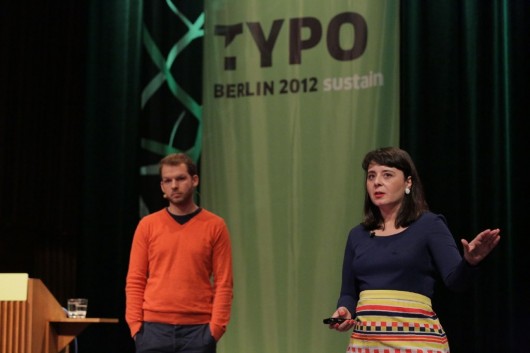The German-spanish couple have been running TwoPoints since 2007 and have built quite an extensive portfolio of work – mainly working in the areas of editorial design and flexible identity systems. According to them, three points are essential to their work: learn, teach and apply. They are both doing Phds, Lupi in Design Education, Martin in Flexible Design Systems. They have both been teaching what they know since 2005. And they both apply this knowledge into their design practice.
During the presentation, they run through a number of projects where they explain the specific design strategies applied to each, the flexible visual systems that they derive from these strategies, and the editorial aspects of their work. The talk is mainly a portfolio presentation, although they touch on some interesting points, such as the importance of stating “we are the designers” when dealing with know-it-best clients (MAIO), the importance of creating flexible systems for changing work frames (Helsinki Design Lab), and the attention needed in dealing with the sensibilities of multicultural projects (Arini).
There’s a common theme running throughout their work –crisp, contemporary, well-executed typography and graphics – which makes for a very coherent portfolio. Obviously, being a big fan of grids, they manage to find room within that to create great “flexible identities”. This love of graphic patterns, combined with careful choice of colour and the right font makes for a very tasteful body of work – something that’s also expressed in Lupi’s wonderful skirt. Overall you can’t deny there’s a German cleanness to their work, even though Martin says “sometimes we try not to be that German”. But there seems to be a good balance between german Kartoffeln and spanish patatas.

Lupi Asensio

Martin Lorenz
All in all, it is an engaging talk, with a few moments of laughter, but for all the talk about how to cut the potatoes in the right way so that they make the perfect tortilla, perhaps there was a bit of seasoning missing. If you happen to be in Berlin in the near future make sure to watch this space, their new project Design Werkstatt.
Text: Ann-Kristina Simon & Ana Viegas | Graphic Birdwatching










 Photo © Gerhard Kassner
Photo © Gerhard Kassner










